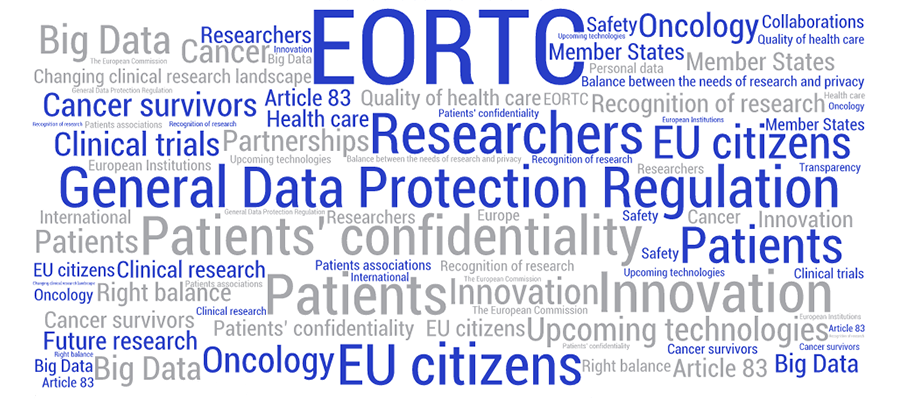EORTC welcomes the agreement on the new EU Data Protection Regulation
21 Dec 2015
EORTC welcomes the agreement reached after delicate negotiations by the European Institutions on the General Data Protection Regulation. It is of crucial importance for the EU citizens, and more specifically patients, that data protection rules in Europe enable health care researchers and their partners to optimally use certain categories of personal data. These data can support, improve, and preserve the quality of health care and also foster innovation within the EU without jeopardizing patients’ confidentiality.
This is especially critical within a changing clinical research landscape where international collaborations and partnerships are taking on an ever increasing and important role. Today, clinical research makes use of upcoming technologies, e.g. next generation sequencing, Big Data, etc., that have the capacity to accelerate the translation of knowledge from the researcher to the health care provider. Indeed, there is an increased need for data sharing as recognized and strongly supported by the Clinical trials framework.
More pertinent for oncology, now that outcomes of patients with cancer have improved, and cancer patients now become cancer survivors, new questions need to be addressed, such as long term follow-up of survivors, that need access to patients’ data.
Given these realities, achieving the right balance is of utmost importance. The agreed text provides opportunities for research and, more specifically, health research that will allow us to attain this balance between the needs of research and privacy
Key features of the new regulation include the recognition of research as a lawful purpose for data processing, and the basis for using data for future research based on one time less specific information given to patients, provided consent is unambiguous. It also recognizes the importance of registries and that re-consent may not be always required for the secondary use of data. Furthermore, Article 83 recognizes the value of pseudonymization as being a potentially valid measure for safeguarding patient safety, and it enables Union or Member State law to further specify additional derogations
EORTC is committed to work with Member States, the European Commission, patients associations and all other stakeholders during the implementation period to ensure that the final framework, including Union or Member State laws, maintains the right balance that EU institutions inscribed in this regulation.
In this collaboration, EORTC will specifically ensure that the framework that would finally apply to the constitution of pan-EU databases, their primary and secondary use, is not just simply reaching the right balance. It should also be pragmatic and sound in order to avoid unnecessary administrative burden or unjustified costs, and that it should also account for the increasing needs and demands for data sharing and transparency.
Anastassia Negrouk
Head EORTC International Policy Office
Related News
EORTC: Advancing research and treatment for rare cancers
29 Feb 2024
EORTC Fellowship Programme: celebrating more than 20 years of impactful collaboration
22 Feb 2024
Appointment of Malte Peters as EORTC Strategic Alliance Officer
9 Feb 2024
Unique series of workshops in partnership with the European Medicines Agency (EMA)
7 Feb 2024
EORTC launches a prominent clinical trial in older patients with locally advanced (LA) HNSCC (Head and Neck Squamous Cell Carcinoma)
14 Dec 2023
Seven IMMUcan abstracts selected for ESMO Immuno-Oncology Congress 2023
6 Dec 2023
EORTC Quality of Life measures integrated in CDISC
20 Nov 2023
EORTC and Immunocore are collaborating to launch the ATOM clinical trial of tebentafusp in Adjuvant Uveal Melanoma
7 Nov 2023
Treatment with decitabine resulted in a similar survival and fewer adverse events compared with conventional chemotherapy in older fit patients with acute myeloid leukaemia
31 Oct 2023
New results and forthcoming EORTC trials in rare cancers, lung, head and neck, and breast carcinomas presented at ESMO 2023
20 Oct 2023


